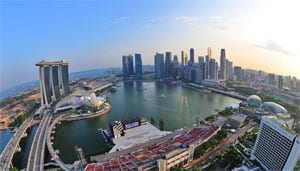MILESTONES: SINGAPORE / INDONESIA
By Gordon Platt
After portfolio managers removed tens of billions of dollars from Asian equity markets during the sell-off in early autumn, corporate valuations are now highly attractive in some industries and sectors.
 |
|
Photo Credit: Jordan Tan / Shutterstock.com |
Given the Singaporean market’s low valuations and the country’s strong fundamentals, including high levels of foreign reserves—exceeding 100% of GDP—there are buying opportunities for equity investors, according to Adrian Lim, senior investment manager for Asian equities at Aberdeen Asset Management Asia, including the Singapore Fund and the Indonesia Fund.
Singapore’s open and trade-dependent economy is slowing to a sustainable 3% to 5% rate of growth, following last year’s record 14.5% surge, Lim says. If the need arises, the government has the ammunition to introduce stimulus measures to buffer against the worst of a slowdown in the global economy. Intraregional trade is also bolstering growth, he adds.
“We see signs of weakness as opportunities to add to existing holdings, which generally have strong balance sheets,” Lim notes. For example, he says, OCBC Bank is very attractive. With major operations in Singapore, Malaysia and Indonesia, OCBC is well capitalized, with good interest margins and cash flow.
Sembawang Shipyard is another Singaporean company with good prospects, he believes. It is a leading ship-repair facility with a strong order book for new builds, including significant contracts for deepwater drilling rigs from Brazil.
In Indonesia, which is enjoying a sweet spot of 6%-plus growth and low inflation, resources are the key driver of the economy, Lim says.
Indonesia also boasts some good opportunities for investment, according to Lim. With a large population and a growing middle class, fast-moving consumer goods companies are attractive for investment. Astra International—an Indonesian conglomerate owned by Jardine Strategic of Hong Kong—is also appealing.



